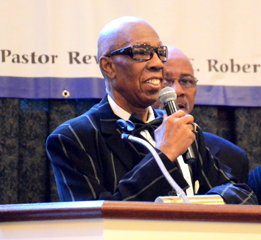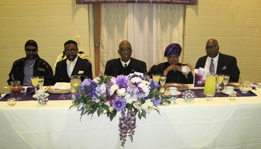
By Rev. Donald L. Perryman, Ph.D.
The Truth Contributor
The hope of leadership lies in the capacity to deliver disturbing news and raise difficult questions in a way that people can absorb, prodding them to take up the message rather than ignore it or kill the messenger. – Martin Linsky
The Rev. John E. Roberts, one of Toledo’s most influential African-American church leaders, was elevated to Pastor Emeritus on Sunday, June 6, in an inspirational appreciation ceremony and worship service at Indiana Avenue Missionary Baptist Church.
Roberts is the community’s longest continuously-serving religious leader. He will relinquish his hectic schedule after 56 years of preaching, attending community events and performing pastoral care activities. For decades, Roberts has also been an unofficial advisor to several leaders and political office-holders.
His longevity illustrates that religious leaders can indeed be impactful without having to become a martyr.
Roberts arrived in Toledo in 1944, migrating from rural Mississippi, where his family had been sharecroppers. After serving as a church officer at Indiana Avenue MBC, founded in 1946, he acknowledged his call to the ministry in September 1962 and became pastor in 1965. He credits the mentorship of older Baptist pastors such as Rev. J.A. Dotson (Calvary), Rev. L. F. Perryman (New Home), Rev. S. M. Coleman (Mt. Pilgrim), and Rev. G. J. Johnson (Friendship), for schooling him on Toledo’s political context and helping to define his pastoral leadership role.
 In the early 1970s Roberts began to evangelize and recruit members from Bowling Green State University where his son Derrick was attending. Many of the students, looking for a black church experience, began showing up and were incorporated into the church’s ministry. The church established basketball leagues and other activities to reach out to and involve youth.
In the early 1970s Roberts began to evangelize and recruit members from Bowling Green State University where his son Derrick was attending. Many of the students, looking for a black church experience, began showing up and were incorporated into the church’s ministry. The church established basketball leagues and other activities to reach out to and involve youth.
Indiana Baptist also erected a banquet hall and supported community programs, many begun by members such as the Josh Project, an attempt to build basic swimming skills, knowledge of water safety and prevent drowning. Roberts was a constant fixture on ball fields, basketball courts, and at high school athletic contests. Several members went on to prestigious college and professional athletic careers under Roberts’ spiritual leadership.
With the church experiencing rapid growth, politicians then began approaching Roberts and Indiana Baptist looking for votes. Counter to the theology of his more conservative-minded colleagues, Roberts began to welcome politicians to the church. Eventually politicians became a fixture at the church not merely during election season but year-round.
“Our church always attempted to help people,” Roberts once explained. “My motto was ‘I don’t mind you (politicians) coming by, but if I help you, then I want you to help me, and I am looking for help with jobs and people who have trouble in the courts. If I support you, then treat us right.’ ”
Under Roberts’ leadership strategy, Indiana MBC reached its peak membership of 4,800 members in the late 1980s. Many congregants were middle-class and upper-middle-class blacks incorporated into mainstream public, private, and educational institutions. These members had quietly used networks established by Roberts to advance into those positions and to transcend complex social issues prevalent in the African-American community.
However, a singular event seemed to take Roberts leadership from merely a congregational function to a public role as he increasingly became the person the white power structure looked to communicate on behalf of the black community.
In 1988 a group of ministers seized the seats of council members during a meeting in City Hall to protest what they considered to be the unjust firing of Pete Culp, a black municipal employee. Although helping to orchestrate the protest, Roberts did not participate. He was criticized by a few black pastors and later explained that he had worked behind the scenes on behalf of the ministers and the fired employee.
“I try to be the peacemaker rather than arguing or fussing,” Roberts explained to me in a 2011 interview. “Anyway, somebody’s got to stay out of jail so we could take care of the issue.”
Roberts insists that he did take care of the problem. “I was in the middle of it with the attorney and City Manager negotiating in the background. And that’s what pushed me into the limelight because the city leaders saw that I wasn’t a part of being arrested but available to negotiate,” he further elaborated.
Although Roberts’ moderate, non-confrontational approach to effecting change without “rocking the boat” has its critics, his rearing in racist rural pre-civil rights Mississippi provides the clue to the longevity of his effectiveness.
Born and raised in segregated Mississippi during the terror of Jim Crow, Roberts learned how to work with power from an economic and entrepreneurial “transactional” perspective when organized black challenges or individual acts of defiance often ended with the brutal death of the protester.
In dealing with established power, he became an expert in expressing defiance in subtle ways. I have noticed that Roberts has a unique gift of humor and wit that obscures his principled tenacity. He has learned to strategically use comedy and satire in a way that allows others to be comfortable in dealing with him.
Equipped with the church’s moral authority and a scandal-free personal life, Dr. Roberts’ preference for negotiation over confrontation has enabled him to serve as a bridge of communication between the white power structure and the black community while attracting resources for congregants and constituents.
Contemporary leadership has two possible strategies to pursue a legacy of benefits, rights, advancement and resources to the black community. One method challenges the system (usually from without) for the resources, while the other approach attempts to cleverly find ways to work within the system.
Roberts found success chipping away at the system for 56 years from within rather than attacking the system from without. The change may have come incrementally and quietly, but it was no less significant.
After all, for some leaders, the task is to “be effective, remain alive and therefore to eschew martyrdom.”
For that reason, Dr. John E. Roberts deserves a “Well Done!” for effectively leading his congregation and community with finesse, dexterity, and cleverness.
Contact Donald Perryman, PhD, at drdlperryman@centerofhopebaptist.org)
